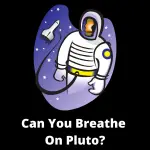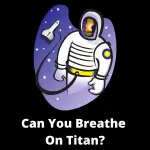No, you cannot breathe on Triton.
In the article that follows, we’ll explain.
Can You Breathe On Triton? (EXPLAINED)
Relevant Facts About Triton
Triton is the largest of Neptune’s 13 moons.
It has a diameter of about 1600 miles, making it close in size to Earth’s moon, which has a diameter of around 2100 miles.
The surface of Triton is solid (unlike the planet it orbits).
The surface is probably nitrogen ice, with rock and metals underneath.
Triton has a thin atmosphere, composed of mostly nitrogen and some methane.
The atmosphere probably comes from the volcanic activity on the moon, though it is possible that the nitrogen comes from the heating/cooling phase changes of the nitrogen ice on the moon’s surface.
Triton is extremely cold, maybe one of the coldest bodies in our solar system.
When Voyager 2 did a fly-by of Triton, it measured the temperature at almost -400 degrees Fahrenheit.
Relevant Facts About Human Respiration
Humans need to breathe oxygen to survive.
Not only do we need oxygen, it needs to be in the right amount.
Humans have evolved to survive on the oxygen in our atmosphere, which is composed about about 20% oxygen and 78% nitrogen.
There are small amounts of other gases such as carbon dioxide, argon, krypton, and more.
For the most part, when humans breathe in these other gases (nitrogen, carbon dioxide, etc), those gases are expelled right back out.
While the composition percentages of the gases in the atmosphere is constant as you move away from the surface of the Earth (for the most part), the overall number of molecules in any given space is less.
The gaseous molecules are more spread out, and each breathe of a human inhales fewer oxygen molecules.
At high altitudes, without oxygen supplementation, humans lose consciousness or even die.
Humans cannot breathe only hydrogen and helium and survive, nor can they breathe the atmospheres of planets that are poisonous/toxic.
Other characteristics of planets in our solar system also make human respiration difficult, such as severe cold, crushing atmospheric pressure, and winds.
Why Can’t Humans Breathe On Triton?
There are a few reasons why humans can’t breathe on Triton, but the obvious one is that there is no oxygen in the atmosphere of Triton.
Without breathable oxygen, humans cannot survive.
But beyond that, humans could not physically inhale the atmosphere on Triton.
The atmosphere is just too cold.
Human tissues would suffer significant damage from exposure to such temperatures.
Further, there is little atmospheric pressure on Triton.
While Triton is not quite a vacuum, it is not far from it.
Exposing the human body to Triton’s atmosphere (and lack of pressure) would likely cause serious injury to the human as the gases and liquids in the tissues struggles against the internal body structures to equalize.
Does This Mean That Humans Can’t Live On Triton?
The lack of breathable oxygen on Triton would not prevent humanity from colonizing Triton.
Triton has a solid surface.
While the atmospheric pressure and gravity are less than that of Earth, they are certainly not in the range of forces that would cause quick death (like on Venus).
There are probably useful and valuable mineral resources under the icy surface crust of the moon.
We’d just need to develop the technology to survive the cold for extended periods of time on the moon.
Did You Know? (Other Facts About Triton)
Here are some facts you may not have known about Triton:
- Triton orbits in the opposite direction of Neptune’s rotation. It is the only moon of any of the planets in the solar system to do so.
- Triton spins relatively fast, as least compared to Earth’s moon. It takes Triton just over five Earth days to rotate fully one time, while it takes Earth’s moon more than 27 Earth days to complete one rotation on it’s axis.
- It also takes Triton about five Earth days to fully orbit Neptune one time.
- Triton is about 2.7 billion miles away from Earth, and about 2.8 billion miles away from the sun.
- Triton was discovered in 1846, within days after researchers discovered Neptune.
- Neptune was named after the Roman sea god Neptune (Poseidon in greek mythology). In greek mythology, Triton is the name of one of Poseidon’s sons.
- Triton has seasons, but like Neptune’s seasons, they are long, around 40 years or so.
- Scientists believe that there may be water ice inside this moon.
- Triton appears to be reddish in color. The color is probably caused by the reaction of UV radiation with the methane ice on the surface.
- Triton is thought to have previously been a resident of the Kuiper Belt. Neptune probably captured it and pulled it out of the belt.
- Triton has it’s own magnetic field, though it is not a strong one. In contrast, Venus does not have a magnetic field (spins too slowly), and Mars’ is inconsistent. The gas giants spin really quickly and have the strongest magnetic fields in the solar system.
Wrap Up
The exploration of space is fascinating, especially as we look for other potentially habitable places in our solar system.
You might also enjoy:
- Can You Breathe on Neptune?
- Can Humans Walk On Mercury?
- Can You Breathe On Ceres?
- Can You Breathe On Pluto?






